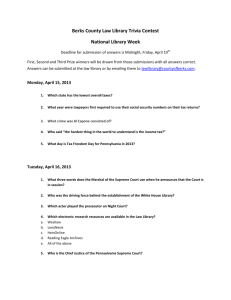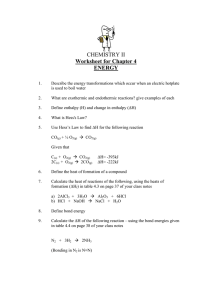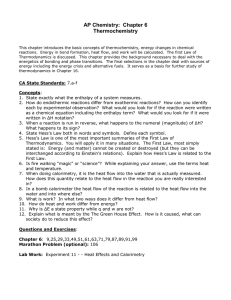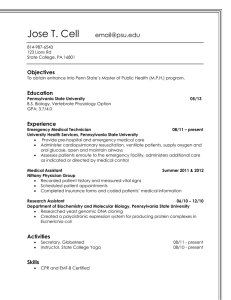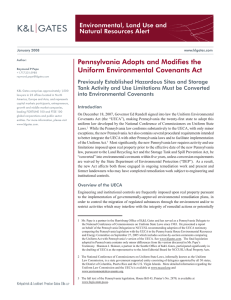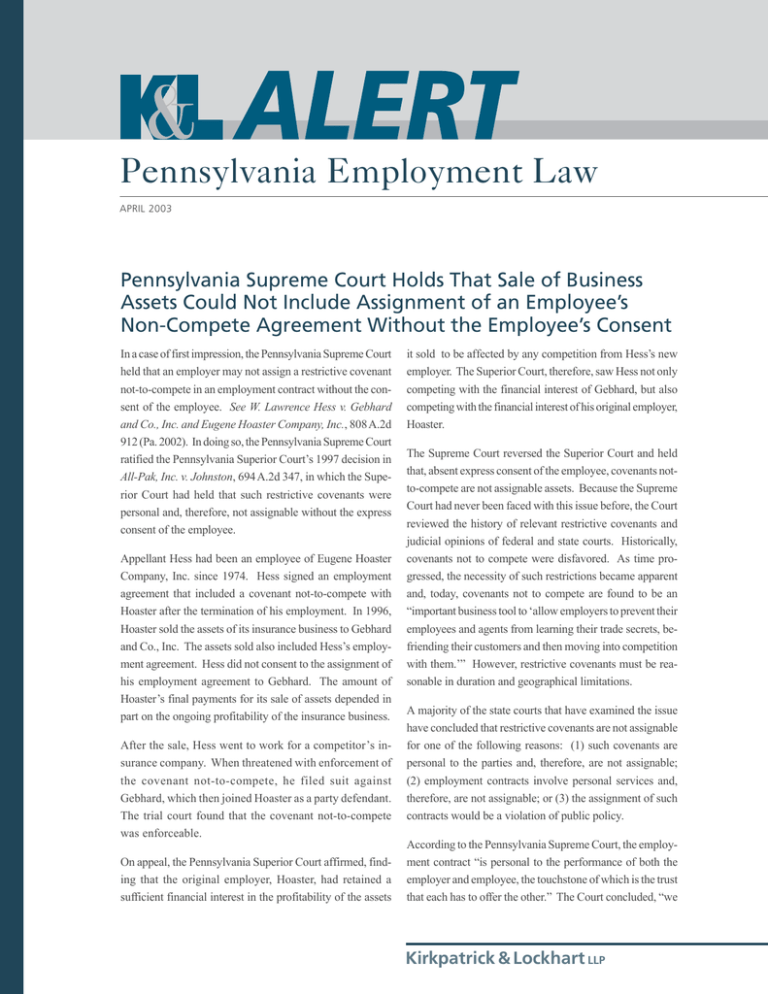
Pennsylvania Employment Law
APRIL 2003
Pennsylvania Supreme Court Holds That Sale of Business
Assets Could Not Include Assignment of an Employee’s
Non-Compete Agreement Without the Employee’s Consent
In a case of first impression, the Pennsylvania Supreme Court
held that an employer may not assign a restrictive covenant
not-to-compete in an employment contract without the consent of the employee. See W. Lawrence Hess v. Gebhard
and Co., Inc. and Eugene Hoaster Company, Inc., 808 A.2d
912 (Pa. 2002). In doing so, the Pennsylvania Supreme Court
ratified the Pennsylvania Superior Court’s 1997 decision in
All-Pak, Inc. v. Johnston, 694 A.2d 347, in which the Superior Court had held that such restrictive covenants were
personal and, therefore, not assignable without the express
consent of the employee.
Appellant Hess had been an employee of Eugene Hoaster
Company, Inc. since 1974. Hess signed an employment
agreement that included a covenant not-to-compete with
Hoaster after the termination of his employment. In 1996,
Hoaster sold the assets of its insurance business to Gebhard
and Co., Inc. The assets sold also included Hess’s employment agreement. Hess did not consent to the assignment of
his employment agreement to Gebhard. The amount of
Hoaster’s final payments for its sale of assets depended in
part on the ongoing profitability of the insurance business.
After the sale, Hess went to work for a competitor’s insurance company. When threatened with enforcement of
the covenant not-to-compete, he filed suit against
Gebhard, which then joined Hoaster as a party defendant.
The trial court found that the covenant not-to-compete
was enforceable.
On appeal, the Pennsylvania Superior Court affirmed, finding that the original employer, Hoaster, had retained a
sufficient financial interest in the profitability of the assets
it sold to be affected by any competition from Hess’s new
employer. The Superior Court, therefore, saw Hess not only
competing with the financial interest of Gebhard, but also
competing with the financial interest of his original employer,
Hoaster.
The Supreme Court reversed the Superior Court and held
that, absent express consent of the employee, covenants notto-compete are not assignable assets. Because the Supreme
Court had never been faced with this issue before, the Court
reviewed the history of relevant restrictive covenants and
judicial opinions of federal and state courts. Historically,
covenants not to compete were disfavored. As time progressed, the necessity of such restrictions became apparent
and, today, covenants not to compete are found to be an
“important business tool to ‘allow employers to prevent their
employees and agents from learning their trade secrets, befriending their customers and then moving into competition
with them.’” However, restrictive covenants must be reasonable in duration and geographical limitations.
A majority of the state courts that have examined the issue
have concluded that restrictive covenants are not assignable
for one of the following reasons: (1) such covenants are
personal to the parties and, therefore, are not assignable;
(2) employment contracts involve personal services and,
therefore, are not assignable; or (3) the assignment of such
contracts would be a violation of public policy.
According to the Pennsylvania Supreme Court, the employment contract “is personal to the performance of both the
employer and employee, the touchstone of which is the trust
that each has to offer the other.” The Court concluded, “we
Kirkpatrick & Lockhart LLP
hold that a restrictive covenant not to compete, contained in
an employment agreement, is not assignable to the purchasing business entity, in the absence of a specific
assignability provision, where the covenant is included
in a sale of assets.”
The Pennsylvania Supreme Court then turned to the issue of whether the restrictive covenant could be enforced
by Hess’ original employer – Hoaster. The Court held
that, despite the fact that it received a portion of the profits related to its former insurance business, Hoaster had
sold the accounts themselves and, therefore, had no legally protectible interest in those insurance accounts.
Further, the Court found that the information possessed
by Hess was not of a proprietary or confidential nature.
“Without a protectible business interest, Hoaster may not
enforce the covenant not to compete.”
It should be noted that this case does not stand for the proposition
that employment contracts in general are not assignable. The court
was not asked to address that issue.
The court drew a bright line that will be increasingly important in
an economy in which so much growth comes from the technology
and service sectors and in which skilled employees and experienced executives are often more important than the physical assets
of a company. The decision will have to be considered in employee compensation negotiations as well as in valuing transactions
between businesses, such as asset sales.
JOHN P. KRILL, JR.
jkrill@kl.com
717.231.4505
LINDA J. SHOREY
lshorey@kl.com
717.231.4510
JACQUELINE JACKSON-DEGARCIA
jjacksondegarcia@kl.com
717.231.5877
FOR MORE INFORMATION, please contact one of the following K&L lawyers:
Boston
Dallas
Harrisburg
Los Angeles
Henry T. Goldman
Jaime Ramón
Carleton O. Strouss
Thomas H. Petrides
Paul W. Sweeney, Jr.
Daniel A. Casey
Marilyn Sneirson
David R. Marshall
Rory J. McEvoy
Stephen M. Olson
Michael A. Pavlick
Hayes C. Stover
Jonathan M. Cohen
Lawrence C. Lanpher
Miami
Newark
New York
Pittsburgh
San Francisco
Washington
617.951.9156
214.939.4902
717.231.4503
310.552.5077
310.552.5055
305.539.3324
973.848.4028
212.536.4066
212.536.4804
412.355.6496
412.355.6275
412.355.6476
415.249.1029
202.778.9011
hgoldman@kl.com
jramon@kl.com
cstrouss@kl.com
tpetrides@kl.com
psweeney@kl.com
dcasey@kl.com
msneirson@kl.com
dmarshall@kl.com
rmcevoy@kl.com
solson@kl.com
mpavlick@kl.com
hstover@kl.com
jcohen@kl.com
llanpher@kl.com
Members of K&L’s Appellate Practice, in consultation with K&L’s Employment and Labor Practice, petitioned for
allocatur, briefed and argued the case discussed above before the Supreme Court of Pennsylvania.
®
Kirkpatrick & Lockhart LLP
Challenge us. ®
www.kl.com
BOSTON
■
DALLAS
■
HARRISBURG
■
LOS ANGELES
■
MIAMI
■
NEWARK
■
NEW YORK
■
PITTSBURGH
■
SAN FRANCISCO
■
WASHINGTON
.........................................................................................................................................................
This publication/newsletter is for informational purposes and does not contain or convey legal advice. Please note that information
about prevailing law is limited to the particular state or federal jurisdiction(s) covered by the cited law and cases, and stricter
rules may apply in some states. This newsletter should not be relied upon in regard to any particular facts or
circumstances without first consulting a lawyer.
© 2003 KIRKPATRICK & LOCKHART LLP.
ALL RIGHTS RESERVED.

